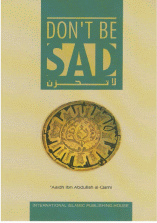Don't be Sad

You are doing well you are healthy and have enough food
In the year 1400 Hijri, I participated in a campaign to propagate Islam, close to the border of Yemen. I temporarily left the camp we were staying in, intending to go with one of my professors to Abha.
On the way back I was upset because he was driving his car at a very high speed. I pleaded with him to slow down, but it seemed that this only had the effect of goading him on to go faster. It was raining that night, yet he continued to drive recklessly. We ended up in a valley that was filling with water. At first the water reached a level only slightly above our tires. As we reached the middle of the valley, though, the situation got worse as water started to flow into our vehicle. We left the car and with much difficulty we managed to reach the edge of the valley. We were stuck there all night without food, drink, and more importantly, because we were wet, without blankets. We were contented and thankful for our situation though, because when the flood had overwhelmed us we had expected to die. And so we were thankful just to be alive. In the early morning somebody came and took us to safety. I am reminded by this incident of a story that took place in World War II. An American ship was hit by a missile and as a result began to sink. The captain was stranded for thirteen days with only water and bread to nourish him. He was later asked whether there was a moral that he took away with him from his experience. He said, "Something important that I took away with me from this experience is that if a person is healthy and has bread and water, he has the whole world with him."
What is this world other than a healthy body, peace of mind, bread, water, and a garment to wear? Why don't you and I use math to calculate what we have and what we don't have'? I think that most of us will find that we have more than 80% of the things that make life comfortable. Needless to say there are exceptional cases when one is deprived of important necessities, but for the most part, we weep over comforts that are missing without laughing and being thankful for those that we do have. We are sorrowful when afflicted, and ungrateful when all is well.
Extinguish the fire of enmity before it spreads
Throughout my life, I found that whenever I defended myself against defamatory comments, loss and regret were the main results. At first I would think it wise that I should set things straight when some person criticized me, regardless of whether the criticism was verbal or written. In the end, however, I found the opposite to be true.
By defending myself, more enmity resulted, and instead of the restoration of good ties between my critic and myself] he would attempt to malign me even further. Eventually I would wish that I had never confronted him in the first place. It would have been better to forgive, forbear, show patience, turn away, and ignore the defamatory remarks. After all, this is what the Qur'an teaches us:
(Show forgiveness, enjoin what is good, and turn away from the foolish [i.e. don't punish them].) (Quran 7: 199)
(Let them pardon and forgive) (Quran 24:22)
(Those who repress anger; and who pardon men…..) (Qur'an 3: I34)
(And when they are angry they forgive.) (Quran 42: 37)
(And when the foolish address them [with bad words] they reply back with mild words of gentleness.) (Quran 25: 63)
(Repel (the evil) with one which is better [i.e. Allah ordered the faithful believers to be patient at the time of anger and to excuse those who treat them badly], then verily! He, between whom and you there was enmity [will become] as though he was a close friend.) (Quran 41: 34)
Therefore, if you hear malicious words from someone, do not answer back: it will only result in multiplying one attack into ten.
